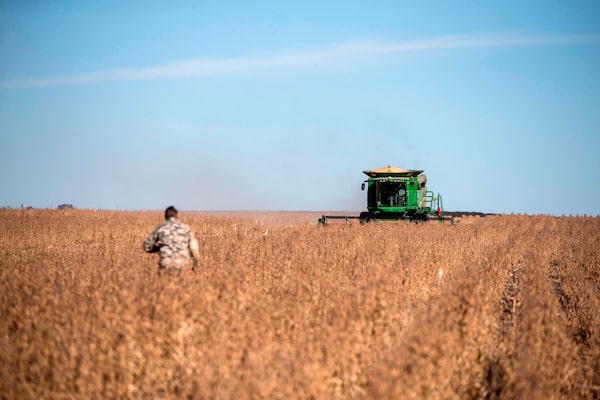
A farmer walks in a soyabean field towards the combine harvester near Bothaville in May.WIKUS DE WET
To hear Donald Trump tell it, South Africa’s white farmers have become martyrs to a policy of racial persecution. The South African government “is now seizing land from white farmers,” the U.S. President tweeted in August, ordering his Secretary of State to investigate the “large-scale killing of farmers.”
After decades of obscurity, the complex issue of South African land policy has leapt onto the agendas of far-right groups in the United States and Canada this year. Their alarmist message, fuelled by a Fox News allegation that white farmers are losing their land “purely because of their skin colour,” is part of a broader narrative that a “white genocide” is spreading around the world.
But as South African MPs debated the land issue this week, the truth is much more mundane. The revisions have become so slow and cumbersome that the new land policy could still be years away. The changes will be bogged down in court cases and logistical challenges, leaving the land largely in the hands of the white farmers who now control it.
As for the “large-scale killing” that Mr. Trump alleged, new crime statistics show that farmers and farm workers represented only 0.3 per cent of all murders in South Africa last year. The vast majority of violent-crime victims are black.
By a 12-4 vote on Thursday, a South African parliamentary committee called for a constitutional amendment that would allow land to be expropriated without compensation. Three political parties voted for it, including the ruling African National Congress, which holds a majority in Parliament.
But there is still a long road to travel before South Africa’s politicians will be able to satisfy all the time-consuming requirements for changing the constitution. It certainly won’t be done before the national elections next year, and those elections will cause further delays in the process.
In sharp contrast to the Zimbabwe land invasions that are often evoked by right-wing groups in the campaign to raise international alarm, South Africa’s process has been painstakingly cautious.
It has taken nine months of slow work – including dozens of public hearings, more than 720,000 written submissions and two extensions of the committee’s deadline – to get as far as the first decision by the constitutional review committee this week. And in a further complication, lobby groups and opposition parties are already planning to launch a court challenge of the committee’s vote, complaining that the committee failed to consider all of the written submissions.
Five of South Africa’s political parties are opposing a constitutional amendment on land expropriation. In their submissions to the committee, each raised procedural objections that could set the stage for more legal challenges in the future.
Even after the committee vote this week, the changes are facing many more hurdles. There will be debates and votes in both houses of Parliament, a new committee to draft the amendment, an accompanying law in Parliament, more public hearings, more written submissions and more votes. The drafting process will be difficult because the two biggest supporters of a constitutional amendment, the ANC and the opposition Economic Freedom Fighters, have deep disagreements on the wording of the amendment.
One reason to anticipate long delays is the track record of South Africa’s own postapartheid history. The ruling party, the ANC, has been promising land-policy changes since it took office in 1994. Yet little has changed, and the vast majority of private commercial farmland still remains in the hands of white farmers. Hobbled by corruption, institutional weakness and legal confusion, the ANC government has lacked the technical capacity and political willpower to make any substantial changes in land ownership, despite the persistent inequality and the continuing land scarcity for many impoverished blacks.
In 1994, the government set a goal of transferring 30 per cent of agricultural land to black owners by 2014, but it has fallen far short of that target. Somewhere between 9 per cent and 21 per cent of farmland has been transferred to black people over the past two decades, studies have found.
The government set up a process of land claims to provide justice to those who lost their land under the apartheid and preapartheid regimes, but 26,000 of those claims are still unresolved. At the current pace of about 560 claims being settled a year, it could take 46 years to settle the claims. And thousands of additional claims were filed when the process was recently reopened.
As the country debates a possible constitutional amendment, President Cyril Ramaphosa has appointed an advisory panel to recommend a land-policy process that will provide greater justice for South Africans – but will also protect food security, increase agricultural production and bolster economic growth.
“We are not going to do it in terms of people grabbing land and creating disorder,” Mr. Ramaphosa told journalists in France this week.
 Geoffrey York
Geoffrey York